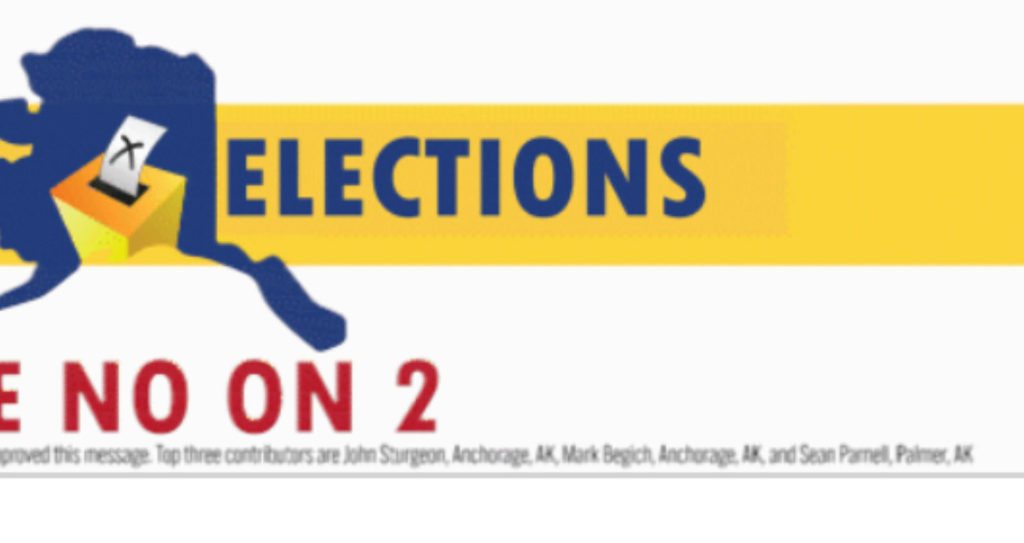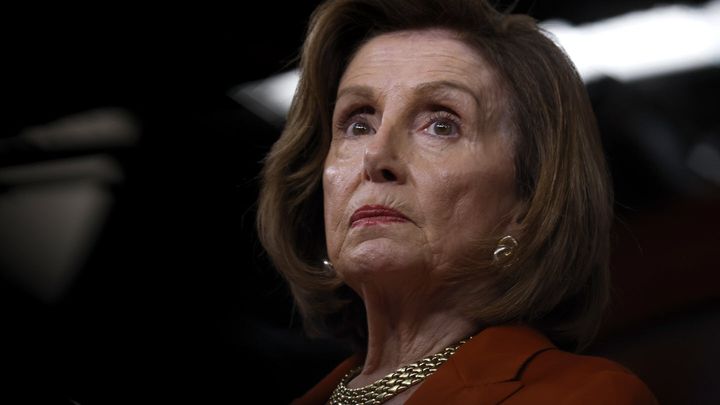The campaign against a ballot measure to increase disclosure of “dark money” in Alaska’s elections and institute a ranked-choice voting system has been caught trying to keep its donors hidden from voters.
Earlier this month, the Alaska Public Offices Commission (APOC) determined that television, radio, and digital ads from Defend Alaska Elections (DAE), the campaign opposing Alaska Ballot Measure 2, violated the state’s post-Citizens United law requiring all political ad sponsors to identify their top three donors along with the “paid for” disclosure. The ads named three well-known Alaskans as DAE’s top donors—hovercraft moose hunter John Sturgeon, former U.S. Sen. Mark Begich, and former Alaska Gov. Sean Parnell—despite the fact that by the time they began airing DAE had raised several far larger contributions from PACs and political party groups based outside of the state.
While the group’s television and radio ads have been corrected, some of its web ads still include the same incorrect disclosure that was found to be in violation of the law. DAE ads reviewed by Sludge on state political news and opinion website The Alaska Landmine were still showing the incorrect donor disclosure as of the date of publication.

“DAE has had ample time and notice to send an email correcting these advertisements, and DAE’s refusal to even attempt to correct these ads can only be described as an unambiguous commitment to violating Alaska’s campaign disclosure laws,” said Robert Dillon, a political consultant working with Alaskans for Better Elections, the campaign committee formed to advocate for the measure.
So what is DAE hiding by obscuring its donor disclosures? According to DAE’s 30-day campaign finance report, one of its top donors is the super PAC affiliate of Virginia-based Americans for Prosperity (AFP), the conservative “dark money” group founded by billionaire industrialists Charles and David Koch. AFP Action donated $45,000 to DAE. Requiring big political donors to identify themselves to voters is supported by people across the political spectrum, so being publicly affiliated with AFP and Koch—the name most commonly associated with secretive political influence—could be a political liability for DAE.
AFP, which is set up as a “social welfare” nonprofit and not required to disclose its donors, operates a chapter in Alaska that opposes many of Democratic Anchorage Mayor Ethan Berkowitz’s policies while working closely with Republicans in the state. In 2019, AFP sponsored and funded field hearings in five Alaskan cities for Republican Governor Mike Dunleavy’s controversial budget, which proposed deep cuts in education and social services. The AFP hearings were the only public budget hearings besides those held in the remote capital city of Juneau.
Other top donors to DAE include the Republican Party of Alaska ($50,000) and the Republican State Leadership Committee ($50,000), the state campaign arm of the national GOP that is funded by the U.S. Chamber of Commerce and a range of American corporations and trade associations. Another top donor is D.C.-based Club for Growth ($30,000), a dark money group that has received funding from the Koch-affiliated Center to Protect Patient Rights and Freedom Partners, which until dissolving in 2019 served as the Koch network’s central bank for dispersing funds from a group of secret donors to conservative causes.
Some of DAE’s Facebook ads obscure their donor disclosures in way that may violate the law. One speeds up a reading of the top donors in a way that makes it hard to comprehend, while another jumbles the names of the top donors. A DAE Facebook ad that was posted on Oct. 24 does not include a reading of the top donors as required by Alaska law for all video communications that include an audio component.
“At this point, it is clear that DAE is intentionally violating Alaska’s campaign disclosure laws to mislead Alaskans—in both continuing and new violations—in an attempt to improperly influence the outcome of this election,” said Dillon. “DAE’s blatant and ongoing actions should be considered by APOC when assessing civil penalties, costs, and fees.”
Measure 2 would require individuals and groups that donate more than $2,000 to an entity that made independent expenditures in candidate elections last cycle, is making independent expenditures in the current cycle, or that they know or have reason to know will make independent expenditures in the current cycle to report the true source of their contribution to APOC within 24 hours. The measure states that individuals and groups may not make donations as an intermediary without disclosing the true source of the money.
The measure would also institute an open primary system in which the top four vote-getters for state executive, state legislative, and congressional offices, regardless of party, advance to the general election. For the general election, it would establish a ranked choice voting system that allows voters to rank the candidates according to their preferences. If a candidate ends up with more than 50% of the vote, they are declared the winner. If not, the candidate with the least votes is eliminated and their votes are redistributed to each voters’ next choice. That process is repeated until a candidate has a majority.
A website opposing ranked choice voting, Protect My Ballot, has deep dark money roots. One of its sponsors, Alaska Policy Forum, has been funded in large part by a donor-advised fund sponsor known as Donors Trust, which wealthy conservatives including the Kochs and Bradleys use to make donations while potentially enjoying extra tax benefits. Another Alaska Policy Forum donor is the Lynde and Harry Bradley Foundation, a prominent conservative grantmaking group.
The top donors to the campaign backing Measure 2 are Colorado-based Unite America, which says it lists its donors since 2018 on its website, Texas-based Action Now Initiative, which is controlled and fully funded by billionaire philanthropists John and Laura Arnold, and Massachusetts-based Represent Us, an election reform nonprofit that lists its donors since 2012 on its website, including major dark money group the Sixteen Thirty Fund.
Defend Alaska Elections did not respond to an inquiry from Sludge for this article.
Read more Democracy coverage from Sludge:
Baltimore County Grassroots Groups Look To Continue a Public Financing Wave
Arizona Judge Reinstates GOP Law Shielding ‘Dark Money’
Billionaire Oligarchs and Anonymous Megadonors Behind Amy Coney Barrett Ads
Oregon Voters To Decide on Limitless Corporate Political Donations
Here Are the Billionaires Funding Trump’s Voter Suppression Lawsuits



